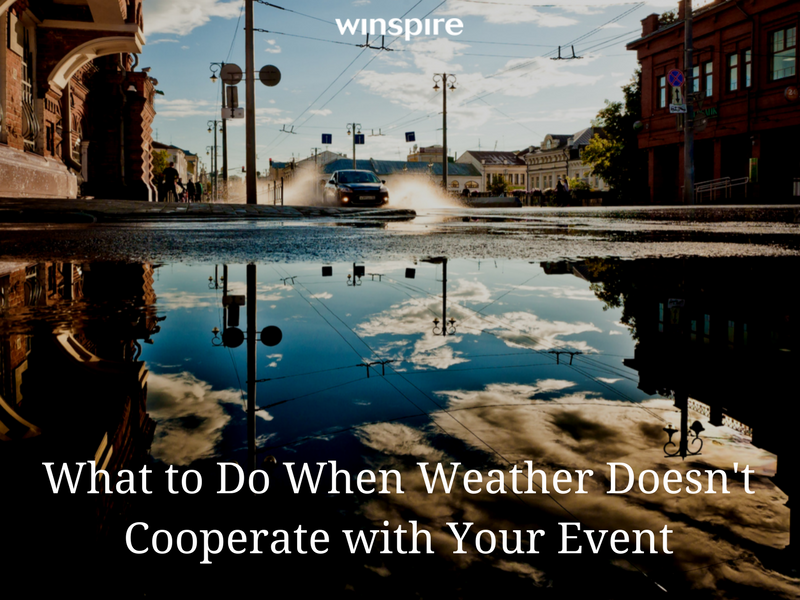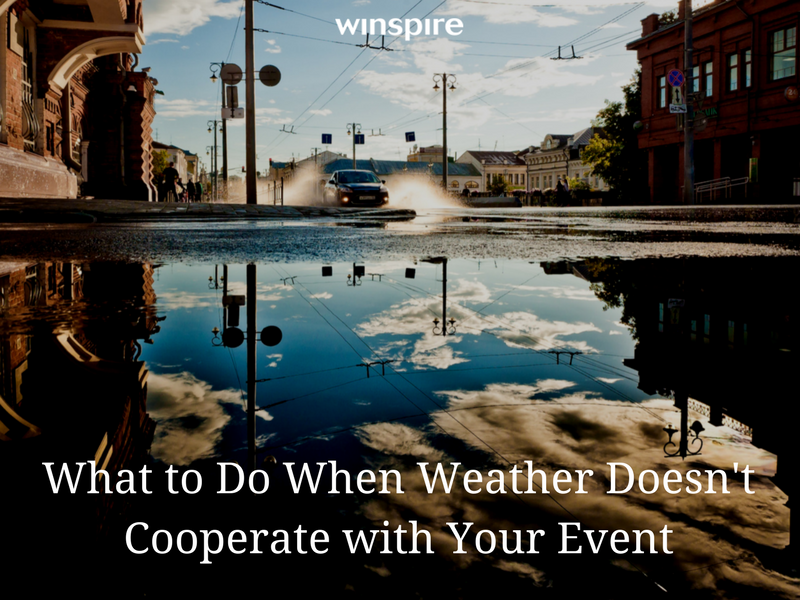With Hurricanes Harvey and Irma battering the Gulf over the past couple weeks, you might be wondering what to do in the event your event crosses paths with Mother Nature.
A sudden heat wave, downpours, storms and even accidents on the highway can derail your plans in a moment’s notice…sending months of hard work down the drain.
In today’s post, learn 5 strategies nonprofits can adopt to protect themselves from significant losses in inclement weather.
1. Consider two important clauses in vendor contracts.
As noted in a previous post, “3 Steps to Negotiating a Better Price on Your Venue,” carefully reading and negotiating your venue contract is one of the most important factors to success.
Before signing off on anything – venue, caterers, auctioneer, performers and more – check if a “force majeure” clause is in the contract. This clause typically indicates that in the event of an “act of God” (i.e. fires, earthquakes and hurricanes), venues and vendors have the right to cancel the event.
Ask what constitutes a “force majeure”, and what is their procedure should an unforeseen emergency or cancellation arise?
We recently interviewed nonprofit coach and mentor Lynda M. West on our event fundraising podcast, Events with Benefits. She shared this great story about how including a “rain or shine” clause saved her event on a record-setting rainy day in Southern California…
“One of my first forays into the world of event fundraising was organizing the ‘Lemon Zest & Garlic Fest’, a community summer food festival in San Diego with live entertainment, cooking demonstrations, arts and crafts, and other activities. We had 160 volunteers and ended up selling 700 tickets prior to the event, thanks to my terrific marketing team. It was the biggest event I had ever put on.
“Festivals and carnivals always have a unique, frenzied planning dynamic, but the date of the inaugural festival happened to receive the most rain in San Diego’s recorded history. <em”>We showed up 7 hours before the event to set up the stage, tents, vendor booths and more. Finally we opened the gates at 11 am… and at 11:05, the skies opened with rain, thunder and lightning in San Diego in July.
“Despite the mayhem that ensued – including ruined band equipment, a shutdown beer garden and plenty of issued refunds – the attendees ended up having a great time. Everyone was smiling and complimenting the enthusiastic volunteers and staff. It was certainly an experience that put my feet to the fire, but I learned a lot.
“One of the main lessons: Reach out and ask for help. Ask people who have been there before. They can tell you what’s going to go wrong before that actually happens. For me, I learned the importance of having a ‘rain or shine’ clause on the tickets and contracts.”
– Lynda M. West (adapted from West’s interview on Events with Benefits)
What will your vendors do in the event of inclement weather? Some may reimburse you in full. Some may agree to reschedule the event at no additional cost, credit you for future services, establish a “rain date,” refund the deposit, and so forth.
Bottom line: Make sure all parties are on the same page – then familiarize yourself and staff and volunteers with the plan well in advance.
2. Analyze the risks of your geographic region and type of event
You don’t have to live on the Gulf Coast to be at risk for extreme weather.
Consider common circumstances in your area that can cancel or significantly delay an event. This could include heavy rains, hurricanes, tornadoes, extreme heat, blizzards and more, depending on the time of year. As a general rule of thumb, anything that stops traffic and/or public transportation is a serious threat to your carefully crafted event agenda.
In addition to external threats, outdoor events are by definition more vulnerable to weather’s whims: golf tournaments, charity races, fun runs, block parties, car washes, home run derbys, walk-a-thons, you name it. Any event with an outdoor component deserves an extra-long look at those contingency plans.
Do you have a rain date in case the rain makes your event impossible (or at the very least, uncomfortable for patrons)? Can the event be moved indoors? If this is your one big fundraiser of the year, you may want to mitigate risks and choose a less risky type of event and time of year.
3. Get event insurance
Did you know that for $500, engaged couples can buy wedding insurance with policies that cover up to $50,000? With the average cost of weddings skyrocketing well past $20,000 these days, they’re smart to be financially prepared for all that could happen.
In the same way, nonprofits can protect their fundraising investments with special event insurance or one-day event insurance. This covers not only weather-related cancellation fees but other types of legal issues – think vendor bankruptcy, property damage, personal injury, liquor liability and more – that can bleed a nonprofit dry.
Coverage depends by provider and level, so be sure to ask what is included before buying.
{{cta(‘bf1118ba-2015-485d-be9f-8891554cc2bf’,’justifycenter’)}}
4. Know when and how to cancel
If a situation becomes unsafe, again the number one priority is keeping supporters out of harm’s way. As the saying goes, it’s better to be safe than sorry. If a guest ventures into a dangerous situation, it will not only reflect poorly on your event and organization but puts you legally at risk.
Well before the event, have a system in place for notifying registrants and attendees of a last-minute or impending cancellation. This could involve an email alert, social media notifications, alert on the website, even an old-fashioned phone tree.
If it’s weather related, particularly for a major storm like a hurricane, participants will already be wondering if the event is still on and calling or checking your website for updates. Still, it’s important to be proactive and use different channels to get the word out as quickly as possible.
5. Brainstorm backup event types
Even in the unfortunate case of a cancellation, stay positive. As West’s story above showed, you never know what great outcomes can happen when things don’t go according to plan.
Once it becomes obvious that the event cannot safely be held, let your venue and other vendors know as soon as possible, then begin looking at alternate dates. Often nonprofits will try to hold the event as soon as possible after the cancellation.
If you need more time to plan, it might be wiser to postpone until next season and, if possible, hold a smaller fundraiser for the time being. If your fall gala got canceled, for example, you might put together a holiday party and silent auction; bowl-a-thon, top golf or other indoor recreation; casino night and more instead.
{{cta(‘c251bc8e-9b36-4c29-a6ed-3beb6b61e263’)}}At Winspire, we always recommend keeping things fresh and thinking outside the box. When your event doesn’t go the way you expected, what better way to surprise and delight donors than to try something new? You just might come up with a fundraiser your donors ask for again next year.
To those affected by the current storms, we wish you safety and a speedy recovery! Let us know how we can be a resource for your rescheduled events.
Your turn – have you experienced a situation that forced a last-minute event cancellation? How did you handle it, and what would you recommend to others in the same situation?
{{cta(‘0d771a74-45f8-4fa7-800e-0e6d53ecee96′,’justifycenter’)}}





